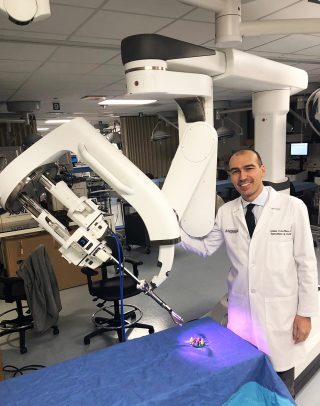UI Health has the only single port surgical robot in Chicago
UI Health is the only hospital with a single port surgical robot in the Chicagoland area. The Da Vinci SP (Single Port) Robotic Platform
Through one approximately 3-centimeter-long incision, surgeons can deploy up to three instruments as well as a camera at the end of a thin, flexible tube. The robot is being used for a variety of minimally invasive procedures at the

“The new robot allows us to perform surgeries in an even more minimally invasive way through just a single incision, down from the four small incisions required for robotic-assisted surgery using our traditional surgical robot,” said Dr. Simone Crivellaro, assistant professor of urology at the University of Illinois at Chicago College of Medicine. “The flexible camera also gives us much more freedom and many more angles from which we can view the procedure compared to previous generation robots where the camera was rigid,” said Crivellaro, who uses the new single port robot to perform prostatectomy procedures to treat prostate cancer at UI Health,
the UIC’s academic medical center.
The single port system includes three multi-jointed, wristed instruments and a fully wristed 3D HD camera — a first in a robotic surgical system. The instruments and the camera all emerge through a single tube and provide 360 degrees of anatomical access.
“Smaller and fewer incisions translate to reduced pain, reduced chances for infection, and sometimes faster discharge from the hospital — all good things for our patients,” said Dr. Pier Cristoforo Giulianotti, chief of general, minimally invasive and robotic surgery at UI Health.
Although primarily used for urological and urogenital surgeries, the single port robot also is being used at the hospital for certain standard pediatric surgeries as well as kidney-related procedures and to treat benign conditions.
“Because of the single incision needed, this new robot lends itself particularly well to working with small children and even babies, where we need to maneuver in smaller spaces, and where several small incisions that we needed with traditional robotic surgery, are quite large considering the overall size of these smallest patients,” said Dr. Enrico Benedetti, head of surgery at UI Health.
UI Health is well-known for its expertise in the minimally invasive and robotic surgery field and is a recognized Center of Excellence in Robotic Surgery — the first hospital to earn this recognition in the United States. Surgeons at the hospital have pioneered the use of robotic surgery to open up the possibility for obese patients to receive kidney and pancreas transplants and have more hours of experience using surgical robots than almost any other team worldwide.
Categories
Health Sciences Colleges, Patient Care, UI Hospital, University
Topics
prostate surgery, robotic surgery, single port robot, surgery
